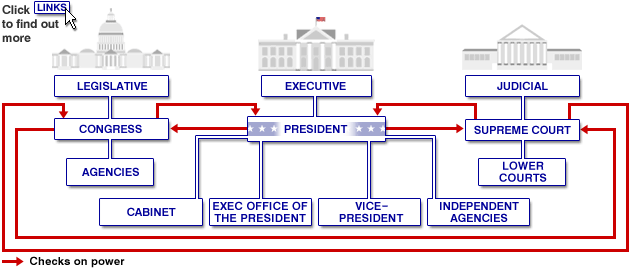

The US is a federal republic of 50 states. The framers of the Constitution, drafted in 1787, wanted to block any individual or group from gaining too much control, so they established a government of separate institutions that share powers. Authority is divided into three tiers of national, state and local government, with the American people electing officials to serve in each tier. At the national level the government is split into three autonomous branches - legislative, executive and judicial. Each has its own distinct responsibilities, but they can also partially limit the authority of the others through a complex system of checks and balances.
Legislative
The legislative branch of government, established in Article I of the Constitution, makes new national laws and modifies existing ones. Under the Constitution this duty is carried out by the Congress, a bicameral body divided into the Senate and House of Representatives. Members of both chambers are directly elected by the people of the state they represent. The House of Representatives has 435 members, with the number representing each state decided according to population size, elected every two years. The Senate is based on equal representation, with each state supplying two of the 100 members, and each has a six-year term.
The founding fathers wanted to check the power of the majority by giving smaller states extra representation, and gave Senators a longer term in office so that they would be less subject to popular pressures.
Congress
Congress has wide-ranging powers including control over federal taxing and spending and the right to coin money or declare war on other countries. Its primary duty is to write, debate and pass bills before they are sent to the president. Money bills can only originate in the House, but both houses need to approve a bill before it can be passed.
Another key task is overseeing the executive branch of government. Congressional committees are tasked with ensuring the government is being run competently and without corruption. To assist in this they can summon senior officials for questioning and demand audits of executive agencies. Congress can also hold hearings on matters of general public concern.
How the president can check the legislature:
Can veto a bill Congress has passed
Can call special sessions and force an adjournment when both Houses cannot agree on adjournment
Can temporarily appoint senior officials without Senate approval when it is in recess
Congress cannot reduce the president's salary while he or she is in office.
How the judiciary can check the legislature:
Has the power to declare laws unconstitutional
Congress cannot reduce a judge's salary while he or she is in office
Chief justice presides over impeachment trials.
Congressional Agencies
As congressional work has grown and become more complex, Congress has come to rely on the advice and assistance of a large number of auxiliary agencies and a large congressional staff. One of the most important agencies is the Congressional Budget Office, a group of experts in economics and statistics, who aid legislators by providing independent, impartial advice on the president's budget proposals. Another is the Library of Congress, which serves Congress as a research facility, and is also the US national library and home to some of its most precious texts, including copies of the Declaration of Independence and the Constitution.
Executive
The executive branch of government is responsible for enforcing the laws of the land. It is made up of the president, the vice-president, the Cabinet and a number of what are known as independent agencies. At the head of the executive branch is the US president, who must "take care that the laws be faithfully executed" and "preserve, protect and defend" the Constitution. In order to carry out this duty, he or she presides over a vast organisation of federal departments and agencies, which has grown over the course of history and now employs about four million people.
President
In addition to leading the executive branch, the president is the head of state and commander in chief of the military. The president's duties include negotiating international treaties, signing or vetoing bills, appointing members of the Cabinet, judiciary and ambassadors and issuing pardons for federal offences. Thanks to its superpower status the US president is often cited as the most powerful person on Earth. But while the office does have significant authority it is limited by the checks and balances enshrined in the Constitution. However the power of the press and the importance of foreign policy has enormously boosted the authority of the president in recent times.
How the legislature can check the president:
Can refuse to pass a bill the president wants or to approve presidential appointments
Must approve budget, declarations of war and treaties
Can override presidential vetoes and use impeachment powers to remove the president from office
Chooses the winner of a presidential or vice-presidential election when no candidate has a majority of electoral college votes
President must periodically report to Congress by delivering a State of the Union address
How the judiciary can check the president:
Can declare executive orders unconstitutional
Chief justice sits as president of the Senate during presidential impeachment trials.
Cabinet
The Cabinet is traditionally made up of the vice-president and the heads of the 15 executive departments - agriculture, commerce, defence, education, energy, health and human services, homeland security, housing and urban development, interior, labour, state, transportation, treasury, veterans' affairs, and the attorney general. These department heads are appointed by the president, and must be approved by a majority vote of the Senate. Other officials or agencies can be given Cabinet rank if the president chooses.
Cabinet members must work closely with the congressional committees who control their budgets and write the laws they have to implement. While some cabinet members are key advisors to the president, others may essentially serve in a more adminstrative capacity.
